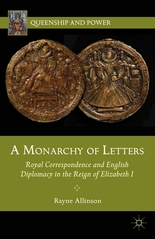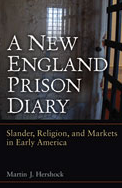
Faculty, staff, alumni and students are welcome to submit their recently published titles to this column by e-mailing Reporter editor Kate Malicke at kmalicke@umich.edu with a summary of the book, a high-resolution JPEG of the book’s cover and a URL where readers can purchase the title, if applicable.
 Rayne Allinson, assistant professor of history, recently published A Monarchy of Letters: Royal Correspondence and English Diplomacy in the Reign of Elizabeth I, through Palgrave Macmillan.
Rayne Allinson, assistant professor of history, recently published A Monarchy of Letters: Royal Correspondence and English Diplomacy in the Reign of Elizabeth I, through Palgrave Macmillan.
Queen Elizabeth I (1533-1603) sent more letters into more distant kingdoms than any English monarch had before, and her exchanges with an ever-growing number of rulers reveal how shifting conceptions of sovereignty were made manifest on paper. This book examines Elizabeth's correspondence with several significant rulers, analyzing how her letters were constructed, drafted and presented, the rhetorical strategies used, and the role these letters played in facilitating diplomatic relations. Elizabeth's letters did more than authorize diplomatic action abroad: In most cases they reflected, and sometimes even influenced, the direction of foreign policy.
 Martin Hershock, associate provost and professor of history, released A New England Prison Diary: Slander, Religion, and Markets in Early America, through The University of Michigan Press.
Martin Hershock, associate provost and professor of history, released A New England Prison Diary: Slander, Religion, and Markets in Early America, through The University of Michigan Press.
In 1812, New Hampshire shopkeeper Timothy M. Joy abandoned his young family, fleeing the creditors who threatened to imprison him. Within days, he found himself in a Massachusetts jailhouse, charged with defamation of a prominent politician. During the months of his incarceration, Joy kept a remarkable journal that recounts his personal, anguished path toward spiritual redemption. Hershock situates Joy's account in the context of the pugnacious politics of the early republic, giving context to a common citizen's perspective on partisanship and the fate of an unfortunate shopkeeper swept along in the transition to market capitalism.
In addition to this close-up view of an ordinary person's experience of a transformative period, Hershock reflects on his own work as a historian. In the final chapter, he discusses the value of diaries as historical sources, the choices he made in telling Joy's story, alternative interpretations of the diary, and other contexts in which he might have placed Joy's experiences. The appendix reproduces Joy's original journal so that readers can develop their own skills using a primary source.




